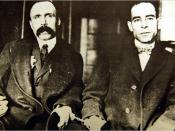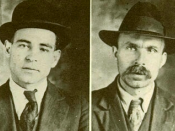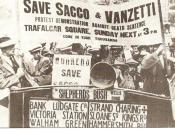Nicola Sacco and Bartolomeo Vanzetti, two Italian immigrants associated with anarchists, were convicted and executed because of their political beliefs. They were convicted of the murder and theft of a paymaster and his guard, in South Braintree, Massachusetts. There has been no powerful evidence linking them to the crime. They just happened to fall into a police trap. The Sacco and Vanzetti case was unjust, unfair, and extremely one sided. Sacco and Vanzetti were convicted because of their radical beliefs and ethnic background.
On the evening of May 5, 1920 Nicola Sacco and Bartolomeo Vanzetti fell into a police trap set up for the suspects in the Braintree crime. The Braintree crime was a crime in which two gunmen fired on a paymaster and his guard, carrying $15,776 at 3 P.M. on April 15, 1920, in a small industrial town south of Boston, named South Braintree, Massachusetts. The gunmen took the cash boxes and took off in a waiting automobile.
"This type of brutal murder and robbery was not uncommon in post World War I America; therefore at this stage in the crime, it only aroused local interest" (D'Attilio). When approached by police, Sacco and Vanzetti were both carrying guns and lied to police during questioning. Although they were not originally under suspicion, they were held and accused for the Braintree Crime. According to Robert D'Attilio, the police trap they had fallen into had been set up for a friend of theirs, who was suspected primarily because he was a foreign born radical. While neither Sacco nor Vanzetti had any previous criminal record, they were recognized as anarchist militants. These events were the beginning of "twentieth-century America's most notorious political trial" (D'Attilio).
Sacco and Vanzetti's arrest coincided with a time of intense political repression in American history, the...


